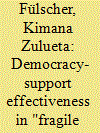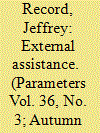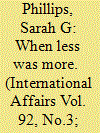| Srl | Item |
| 1 |
ID:
130928


|
|
|
|
|
| Publication |
2014.
|
| Summary/Abstract |
Processes of political transformation and external assistance in fragile states have received increasing attention in the academic literature over the past decade. This literature, however, has not yet adopted a multi-dimensional categorization of fragility. This article discusses the evolution of the concept of fragility, and assesses the growing literature on processes of political transformation in fragile states, with a special focus on the quantitative literature and on the effectiveness of external democracy-support policies. Its novelty lies in its contribution to drawing links between these parallel bodies of literature. Furthermore, this article argues that, by incorporating a more complex definition of fragility, future research could reach more nuanced approaches on how fragility influences both processes of democratization and the effectiveness of democracy-support policies.
|
|
|
|
|
|
|
|
|
|
|
|
|
|
|
|
| 2 |
ID:
074362


|
|
|
| 3 |
ID:
145289


|
|
|
|
|
| Summary/Abstract |
The internationally unrecognized ‘Republic of Somaliland’ presents a case in which the domestic drivers of peace and development may be examined when aid and other forms of international intervention are not significant variables. The relative autonomy of its peace process offers an alternative perspective on post-conflict transitions to that offered in the majority of the literature, which instead problematizes either the perverse outcomes or unintended consequences of international interventions in conflict-affected areas. The purpose of this article is not to establish the salience of Somaliland's relative isolation in its ability to achieve peace and relative political order, as this is already documented in the literature. Rather, it explores the ways in which that isolation fostered mutual dependence between powerful political and economic actors for their survival and prosperity. It uses a political settlements framework to probe the implications of this dependence for western statebuilding interventions in post-conflict situations. The findings present a challenge to orthodox assumptions about how states transition out of conflict, particularly that: greater vertical inclusivity necessarily strengthens a political settlement; effective Weberian institutions are a prerequisite of an enduring peace; and that external assistance is usually necessary to end large-scale violence in developing states or to prevent a recurrence of the conflict.
|
|
|
|
|
|
|
|
|
|
|
|
|
|
|
|